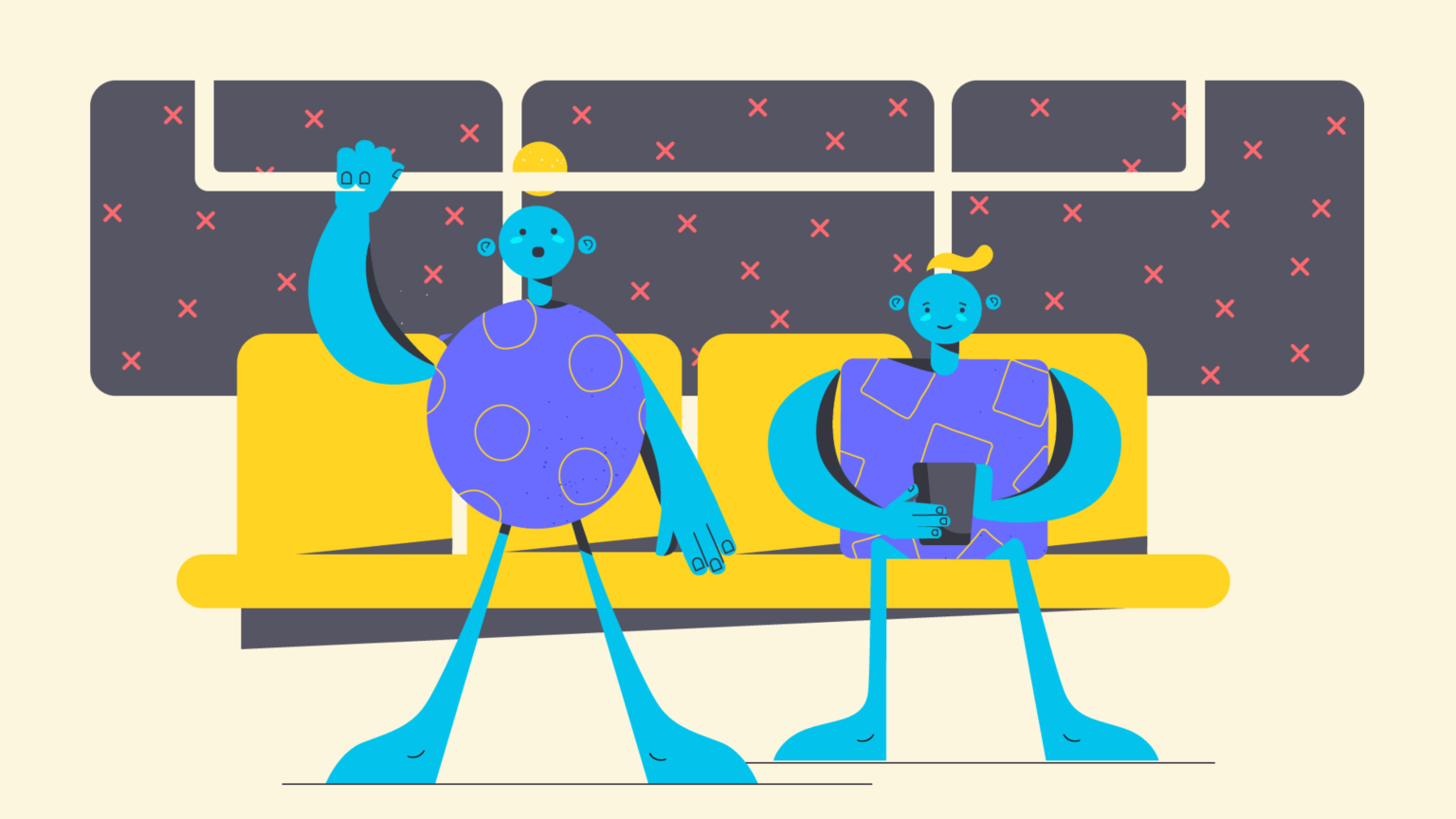
Panik
16. April 2022 — 5 Minuten Lesezeit
Eine psychische Störung verändert nicht nur den Alltag der betroffenen Person, sondern auch das Leben der Familie, der engen Freund:innen oder der Partner:in.

Eine psychische Störung wie eine Angststörung verändert nicht nur den Alltag der betroffenen Person, sondern auch das Leben der Familie, der engen Freund:innen oder der Partner:in. Als Angehörige:r bist du ein wichtiger Bestandteil des Behandlungsprozesses, allerdings kann die Störung der betroffenen Person auch viele Herausforderungen mit sich bringen und manchmal sehr belastend sein. Wir möchten Angehörige unterstützen, indem wir ihnen das Leben erleichtern und Aufgaben abnehmen. Aber fördert das nicht nur die Unselbstständigkeit der erkrankten Person? Und was macht die Erkrankung einer nahestehenden Person eigentlich mit uns und warum ist es so wichtig, dass wir auch uns selber schützen?
In diesem Artikel erfährst du, wie du den Balanceakt zwischen Beistand und eigener Gesundheit besser meistern kannst.
Als Vertrauensperson bist du für einen Menschen mit einer Angststörung besonders wichtig. Nimm ängstliche Gefühle der anderen Person immer ernst und mach dich nicht lustig, auch wenn die Angst scheinbar unbegründet ist. Vermeide unbedingt Sätze wie „Stell dich nicht so an“ oder „Reiß dich zusammen“. Äußere stattdessen dein Verständnis und höre erst einmal zu.
In einer akuten Angst- oder Paniksituation kann es sein, dass die Person gerade nicht in der Lage ist, ausführlich zu kommunizieren. Sprich in kurzen Sätzen, die auch mit einem Kopfnicken oder Schütteln beantwortet werden können. So kannst du zum Beispiel fragen, „Hilft es wenn ich mich zu dir setzte?“ Oder „Soll ich dich begleiten?“
Oft dauert es einige Jahre, bis Betroffenen sich an eine Therapeuten:in wenden. Das liegt hauptsächlich an der Stigmatisierung von psychischen Erkrankungen und der Beanspruchung von psychologischer Hilfe. Wenn die fehlende Inanspruchnahme von Hilfsangeboten bei Betroffenen der Fall ist, kannst du ein Gespräch suchen. Du darfst ehrlich sein und deine Einschätzung beschreiben, achte aber darauf, dass du ruhig, verständnisvoll und wertschätzend bleibst. Mache der betroffenen Person klar, dass die psychologische Unterstützung kein Zeichen von Schwäche ist. Im Gegenteil, es zeugt von Mut und Stärke, Hilfe in Anspruch zu nehmen und Probleme anzugehen.
Oft ist die Suche nach einem Therapieplatz nicht so einfach, für die Überbrückungszeit könntest du der betroffenen Person die App auf Rezept Mindable: Panik & Agoraphobie empfehlen. Diese wird von der Krankenkasse erstattet und kann eine große Unterstützung sein. Infos zur App und dem Verschreibungsprozess findest du hier.
Wenn eine Person in der Familie oder die Partner:in an einer Angststörung leidet, kann dies oft die Pläne aller durcheinander bringen. Es wird zum Beispiel ein Umweg gefahren, um einen Tunnel zu vermeiden oder gemeinsame Ausflüge und Freizeitaktivitäten abgesagt. Der ganze Alltag dreht sich plötzlich um potenziell gefährliche Situationen und wie sie gemieden werden können. Wichtig ist es, unbedingt darauf zu achten, dass hierbei nicht unbewusst das Vermeidungsverhalten gestärkt wird. Nimm der betroffenen Person also nicht alle Aufgaben ab, sondern versuche sie zu ermutigen, sich bedenklichen Situation zu stellen. Konkrete Ziele können hierbei helfen, sich langsam an die Bewältigung der Angst zu tasten. Beachte unbedingt, dass du die Person nicht unter Druck setzt und erkenne auch kleine Erfolgserlebnisse an. Nur durch eine direkte Auseinandersetzung können Ängste langfristig abgebaut werden.
Mache der betroffenen Person klar, dass du immer da bist, wenn du gebraucht wirst. Lasse aber sonst so viel Selbstständigkeit wie möglich zu.
Um die Herausforderungen einer Angststörung besser zu verstehen, ist es hilfreich sich mit dem Störungsbild vertraut zu machen. Hier findest du eine Übersicht zu verschiedenen Angststörungen.
Solltest du noch offenen Fragen haben, dann vereinbare einen Termin mit der behandelnden Psychiater:in oder Therapeut:in. Frage nach, ob die betroffenen Person damit einverstanden wäre, wenn du an einer Sitzung teilnimmst oder nimm den Termin alleine wahr. Informiere dich über Symptome, Medikamente und den Behandlungsverlauf. Einige Kliniken und Verbände bieten ebenfalls kostenlose Informationsveranstaltungen oder Rufnummern für Angehörige an. Wenn du die Angststörung verstehst, kannst du Verhaltensänderungen wahrnehmen und besser einschätzen. Außerdem erhältst du ein Verständnis für die betroffene Person. Du kannst begreifen, warum sie leidet und das ihr Verhalten keiner bösen Absicht entspricht.
Die Diagnose einer psychischen Störung kann bei dir als Angehörige:r ganz unterschiedliche Gefühle auslösen: Von Wohlwollen und Verständnis, bis hin zu Unsicherheit, Hilflosigkeit und Scham. Ganz egal welches Gefühl dir begegnet, nimm dir Zeit, dich damit auseinanderzusetzen.
Deine Unterstützung und dein Verständnis sind für Betroffene von großer Bedeutung. Als Angehörige:r kannst du jedoch auch vielen Herausforderungen und Belastungen ausgesetzt sein. Wenn du deine Grenzen erreicht oder vielleicht sogar schon ausgereizt hast, ist es an der Zeit, dich selber zu schützen.
Das fällt meist schwer, da das Gefühl entstehen kann, die erkrankte Person im Stich zu lassen. Mache dir bewusst, dass niemandem geholfen ist, wenn auch du zunehmend leidest. Es ist dein gutes Recht, Grenzen zu setzen, wenn du Auswirkungen auf deine Gesundheit, deine Lebensgestaltung oder dein Wohlbefinden verspürst. Sorge für dich, indem du Kontakte pflegst und Dinge in deinen Alltag integrierst, die dir Freude bringen. Achte stets darauf, dass du achtsam mit deinen Kräften umgehst.
Weiterhin kannst du dich selbst schützen, indem du Verantwortung abgibst. Du kannst zum Beispiel professionelle Hilfe annehmen. Einige Kliniken bieten Gesprächsrunden für Angehörige an, dort kannst du dich mit Menschen in einer ähnlichen Situation austauschen, deine Sorgen ansprechen oder Erfahrungen teilen. Eine weitere Möglichkeit für einen intensiven Austausch und Hilfestellungen sind Selbsthilfegruppen oder Angebote der Telefonseelsorge. Du kannst auch selbst Kontakt zu Therapeut:innen aufnehmen, die dir bei dem Umgang und der Bewältigung dieser Situation helfen können.
Hier kannst du deutschlandweit suchen, wo und welche Selbsthilfegruppen es gibt
Weiterhin kannst du Angebote der Telefonseelsorge in Anspruch nehmen: